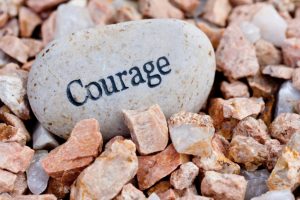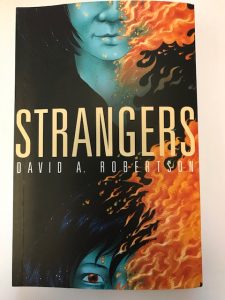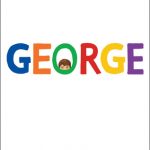One would think that ‘modern people’ have made great progress over the last decades. Indeed, we live in the era when people feel free to express themselves and reveal their identities, regardless of their place or occupation, and yet, many people, including some educators, fail to acknowledge the need to improve the curriculum experiences by paying due consideration to the needs and/or interests of those students representing a specific gender-/sexual-minority because of the fear of facing community protest (Page, 2016). In fact, it is shame that modern societies fail to let go of their hatred and intolerance towards those who are different but teachers, as well as other literacy educators, are the ones who take an active part in “raising” new generations of people that are supposed to be better than older ones, that is exactly why teachers should not hesitate to make curricula more inclusive for all kinds of students and make every attempt to encourage students to think outside the box and learn to accept others people’s differences.
The perks of living poetically
 Leggo (2005) puts forward an idea that poetry is in possession of a distinctive force that can inspire, educate, and to re-energize one’s life force. In this context, he also suggests that basically everybody could sometimes turn themselves into poets to be able to explore the unique possibilities it offers. I assume that Leggo (2005) actually has a good point here. What if we all decide to live poetically at least for one day, how may this experience change our perception of ourselves, our purpose in life, and our sense of perception? I would argue that it is very likely to change our worldview dramatically. Poetry may indeed serve as a source of wisdom, inspiration, and hidden knowledge, thus making one reveal something about their own selves and battle their fears and insecurities. The point is that poetry has an ability to provide insight into universal matters that form human essence.
Leggo (2005) puts forward an idea that poetry is in possession of a distinctive force that can inspire, educate, and to re-energize one’s life force. In this context, he also suggests that basically everybody could sometimes turn themselves into poets to be able to explore the unique possibilities it offers. I assume that Leggo (2005) actually has a good point here. What if we all decide to live poetically at least for one day, how may this experience change our perception of ourselves, our purpose in life, and our sense of perception? I would argue that it is very likely to change our worldview dramatically. Poetry may indeed serve as a source of wisdom, inspiration, and hidden knowledge, thus making one reveal something about their own selves and battle their fears and insecurities. The point is that poetry has an ability to provide insight into universal matters that form human essence.
Reflections on courage
 Tracey, Menickelli, and Scales (2016) describe a case study that to my minds, is part of one of the most interesting readings that we have managed to cover during this course. After reading the article I could not stop wondering about how rarely we think about courage and the role it plays in our lives. When reading about six grades who had an exceptional opportunity to devote three weeks to a thematic text set unit during which they managed to acquire some useful literacy skills and learn some strategies, I found myself thinking about how vital such courses really are due to their ability to draw young children’s attention to things that actually matter and to inspire change. I was not particularly surprised to find out how successful this project was. As a matter of fact, I am looking forward to coming up with a similar learning experiment in future to see how inspirational such practices can be.
Tracey, Menickelli, and Scales (2016) describe a case study that to my minds, is part of one of the most interesting readings that we have managed to cover during this course. After reading the article I could not stop wondering about how rarely we think about courage and the role it plays in our lives. When reading about six grades who had an exceptional opportunity to devote three weeks to a thematic text set unit during which they managed to acquire some useful literacy skills and learn some strategies, I found myself thinking about how vital such courses really are due to their ability to draw young children’s attention to things that actually matter and to inspire change. I was not particularly surprised to find out how successful this project was. As a matter of fact, I am looking forward to coming up with a similar learning experiment in future to see how inspirational such practices can be.
Pluggin books erryday
This gallery contains 1 photo.
Here’s a wonderful book recommendation! An exclusive sneak-peek of the dust jacket flap text (scribed by yours truly (that’s me)): “When people look at George, they think they see a boy. But she knows she’s not a boy. She knows … Continue reading
A Concern of Political Monopolisation of Identity.
One thing that has occurred to me throughout the last few classes when discussing LGBT literature is that of being careful not to isolate the identities, and groups associated with such, as under the exclusive reign of the political left. I say this mainly due to a combination of certain themes that did pop up in the last few classes, with the act of teaching being a political action as one of them. Part of the reason I feel this is an area of concern is that if minority identities are over associated with only one part of the political spectrum then those individuals who are of the other parts of said political spectrum risk erasure. I bring this up due to a combination of the need to develop a wide diversity of writings to avoid situations like Advocate.com’s declaration that people like “Thiel [are] an example of a man who has sex with other men, but not a gay man”. Which represents the erasure of an identity due to said person not having the ‘right politics’. The issues that this heavy association of the political left with LGBT creates in the wider culture can be seen in the case of a man named Chadwick Moore. Who wrote, for Out Magazine, an article on a gay conservative man named Milo Yiannopoulos. After this article was written Moore ended up in the situation of being orchestrated by his local community and would later write an article expressing his own ‘coming out’ as a conservative. Overall, what I am trying to say is that if one assumes that one’s identity means that they must fall under a specific set of politics that would just erase those with marginalized identities that don’t necessarily agree with those politics. Therefore, to add an additional layer of complication it may be necessary to seek out a wide diversity of marginalised voices with a rich variety of political views and beliefs. One example of this could be in introducing and discussing why a person like Bruce Benderson would write a book titled ‘Against Marriage’.
Here are some links to the articles mentioned:
https://nypost.com/2017/02/11/im-a-gay-new-yorker-and-im-coming-out-as-a-conservative/
https://www.huffingtonpost.com/bruce-benderson/why-im-against-marriage_1_b_5248992.html
Reflecting on our class discussion
The class discussion we had the other day was powerful and belief changing for me. I think it is so important for us as educators to meet opposition with understanding. Whether that is defiant students or oppositional parents. To me handling defiant students with understanding and the desire for communication is obvious, but I had never thought about what that may look like extended to parents with whom I do not agree.
I know in my teaching I will present ideas which some parents may not agree with, and may even confront me for teaching them to their child. Through the class discussion I have come to realize the heavy amount of love that would accompany a parent confronting a teacher about material they present. Through understanding this disagreement is coming from a place of love and wanting the absolute best for the child on both the parents side and the teachers side, I feel more prepared to come to an understanding and not get defensive or angry.
We Really Do Need To Talk About Kevin
I would like to put forward my favourite novel of all time as a suggestion for teaching to grade 11/12 students.
We Need To Talk About Kevin is an epistolary novel written from the point of view of a mother to her estranged husband regarding the genesis of their son, and the school shooting he eventually commits. It is the fullest, most vibrant depiction of a relationship I’ve ever read, and the most engaging conversation about Nature vs Nurture I’ve ever encountered. The narrator, Eva, is so articulate and honest about her emotions towards her husband, her son and daughter, rich young people in New York, suburban life, travel, sex, maternal love, everything, you’ll have her voice in the back of your head for the rest of your life. There is also a movie based on the book starring Tilda Swinton, Ezra Miller, and John C Reilly, and it too is fabulous–a great way to cap off a unit, no doubt. Seriously give the book a read. I have never read a more honest depiction of the complexities of the emotions we feel for those closest to us. Nor have I encountered a better way to discuss violence in schools, the meaning of life, of love, and everything else that teenagers are interested in.
Multi-Modal Macbeth
Earlier in this course we spoke about engaging our students beyond the limit of canon captured in printed text. I was reminded of my practicum where I was entrusted with providing the ‘hook’ lesson to a reluctant class turned off by the mere mention of Shakespeare.
What I love about literature is its timelessness. For example, Macbeth‘s (the text we were studying) themes of morality and power are still relevant today. I wanted to pass that onto my students and discover a way for them to fall in love with the content before getting lost in the language. The pressure was on when preparing but I hope (and think) it paid off! To put it briefly, we participated in a few activities, watched a TED-Ed video, and discussed morally ambiguous scenarios (This discussion was the highlight!). I’m sure that if I dove into the text right away, I would have lost them.
Aboriginal Content Matters
After reading Sara Davidon’s article “Prove Them Wrong: Why Aboriginal Content Matters” it made me sad thinking about her experience. I don’t want my students to be ashamed of their culture and who they are. It shouldn’t be the responsibility of every student to challenge any negative assumptions of their cultures. As educators it’s our duty to fairly represent every individual in our classroom to the best of our ability. I remember a few years ago when colleagues of mine were nervous to teach Aboriginal content because they didn’t want to misrepresent the culture. But Sara reminds us that it’s crucial to make students feel included and there are negative long term effects if we don’t.
Ruminations on inclusive teaching
I was thinking about the categorization of inclusive LGTBQ curriculum scale as proposed by Michelle Page in the Teaching in the Cracks article. Although I felt that these categories included a bit of judgment as to where a teacher was in their inclusion rate, I see that it could be helpful as another way of examining practice. The article opened my eyes in terms of thinking and learning more about queer theory and how to work this into my teaching. In my library studies courses there is a lot of discussion on the need to create a diverse library collection in which students can clearly see themselves, and this has come up within our class discussions also. As noted, the classic canon does not fit the bill.

A novel that came to mind that I read recently is Strangers: The Reckoner #1 by David A. Robertson, and it also segues into our next focal area of Indigenous literature. This novel falls into Page’s “Visible with Partial Integration” category as it is primarily a supernatural murder-mystery based around a young Aboriginal teen boy, and a sub-plot features a gay couple (one of whom is murdered as part of a bigger plot). The protagonist learns that his best friend was gay and emotionally supports and directly talks with the surviving boyfriend about the relationship. In the story, the character was not killed because he was gay, but instead because of information that he held. I feel like Robertson realistically captured many issues and themes that allow for myriad student to identify: small town life vs. urban life, PTSD, anxiety and medication, death and grieving, LGBTQ-related issues, and teen relationships. I think this novel could easily support inquiry learning as students connect to an issue or theme that relates to them. Direct focus could be pulled onto LGBTQ issues by having students reflect on why the couple had been reluctant to be openly out with their relationship, and to then get into the history of discrimination and the reality of experiences today (at school, in the community, in the world at large).
I recall hearing Wab Kinew talking on CBC about the need for a new Aboriginal narrative in which the difficulties of the past were not always the feature storyline. While not meaning to disregard the past or forget it, he wanted to offer alternatives for modern stories which featured Aboriginal peoples and culture. I wonder if this too could be the case for the LGBTQ community? Is partial integration lesser? Or helpful in “normalizing” LGBTQ experiences? Our discussion of the power of story also came to mind. Feedback definitely appreciated!

